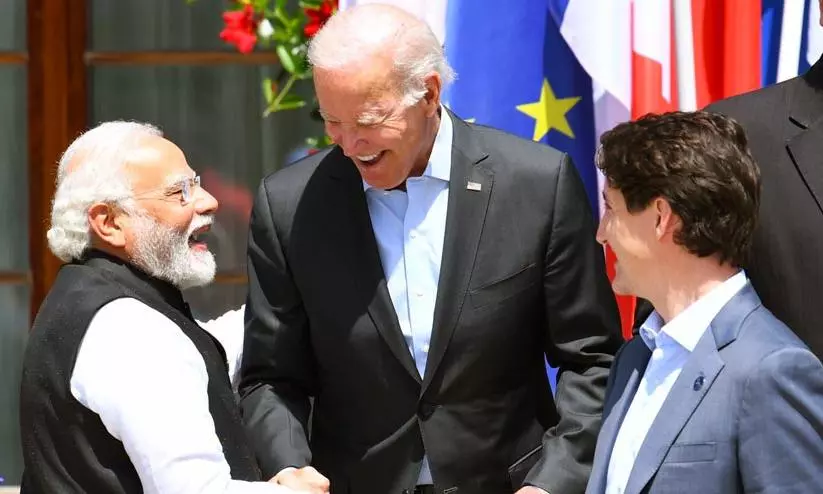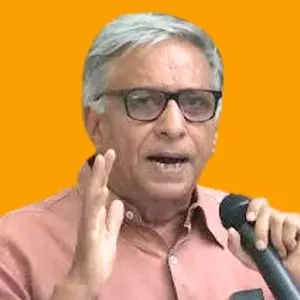
- Home
- India
- World
- Premium
- THE FEDERAL SPECIAL
- Analysis
- States
- Perspective
- Videos
- Sports
- Education
- Entertainment
- Elections
- Features
- Health
- Business
- Series
- In memoriam: Sheikh Mujibur Rahman
- Bishnoi's Men
- NEET TANGLE
- Economy Series
- Earth Day
- Kashmir’s Frozen Turbulence
- India@75
- The legend of Ramjanmabhoomi
- Liberalisation@30
- How to tame a dragon
- Celebrating biodiversity
- Farm Matters
- 50 days of solitude
- Bringing Migrants Home
- Budget 2020
- Jharkhand Votes
- The Federal Investigates
- The Federal Impact
- Vanishing Sand
- Gandhi @ 150
- Andhra Today
- Field report
- Operation Gulmarg
- Pandemic @1 Mn in India
- The Federal Year-End
- The Zero Year
- Science
- Brand studio
- Newsletter
- Elections 2024
- Events
- Home
- IndiaIndia
- World
- Analysis
- StatesStates
- PerspectivePerspective
- VideosVideos
- Sports
- Education
- Entertainment
- ElectionsElections
- Features
- Health
- BusinessBusiness
- Premium
- Loading...
Premium - Events

What stands out in the whole affair is India’s refusal to say anything in public about what’s going on, while the US and Canada have had so much to say
What’s India’s position in the world? The old question rises afresh with some force in the modern era, in the wake of the searing indictment of the Indian establishment by the US and Canada, who accuse India of pushing criminals into those countries to assassinate their citizens, or of plotting to do so, and India maintaining official silence on these matters for the most part.
Both those countries, members of the powerful NATO and G-7, the congress of the seven most influential economies in the capitalist universe, have officially produced lengthy charge sheets and publicised them through the media.
In omnibus, non-specific terms, India has rejected the Canadian allegations. But with the US, it has been deferential.
And the current point of interest is whether it will hand over a former R&AW operative to Washington to be tried there — if not immediately, at a later point. To delay a decision, the best the Indians can do is to place the man in question on trial and stretch out court procedures.
International insult
It seems plain amateurish that India’s much-vaunted diplomatic service did not caution the political and security establishment that the US and Canada were very close security partners, exchanged intelligence, and were also together in a bi-country military alliance called the North American Aerospace Defense Command (NORAD), and therefore, it was foolhardy to think that America would not have Canada’s back on certain matters.
Or, is it that the diplomats did their job but were not heeded by those who run national security affairs — the PMO and the Union Home Ministry? To get to the bottom of things, the government needs to come clean with the public — for, in the final analysis, it is they who have been insulted internationally as India’s image as a responsible nation has been brought under question by the leading Western powers.
Concomitantly, it was likely to take a hit in our own region and outside of it, SAARC countries, and others seeking to leverage the US and Canadian indictment to their advantage in their dealings with India, especially those of a political nature.
Also read: What's troubling about allegations of India’s hand in killing of Khalistani activists in Canada
New Delhi’s stoic public silence
It is not clear if the Indian establishment did actually mark out certain Khalistani leaders in Canada and the US for assassination. But Canadian intelligence has asserted that Home Minister Amit Shah presided over ameeting which green-flagged physical elimination. NSA Ajit Doval is alleged to be closely involved with these processes.
No country has pointed fingers in such a fashion at the highest levels of the Indian political and security establishment ever before.
Oddly enough, while the US and Canada have been airing their suspicions and intelligence estimates, if not details of investigation, through the media on a regular basis, New Delhi has maintained a stoic public silence. It has found itself unable even to summon its wits to remind the US and others that, in modern international life, it is they and their Western friends who have been the earliest authors of overseas assassination bids, even on eminent individuals such as Fidel Castro and Yasser Arafat, and actually masterminding the killing of Patrice Lumumba, for which Belgium eventually apologised in 2002.
Tit for tat
Recently, India blew its top only when Ottawa sought to question its most senior diplomats. Canada declared the six diplomats as "persons of interest", and asked India to strip them of their diplomatic cover so that they may be interrogated by the Canadians.
India withdrew the six, and immediately "expelled" the same number of senior Canadian diplomats. The Canadians then simultaneously "expelled" the six Indians, realising full well India was not going to end their diplomatic cover, as requested.
India then proceeded to attack Canadian Prime Minister Justin Trudeau in an official statement for playing politics in relation to the Sikh community ahead of the national election, while hotly denying the Canadian accusation of having any hand in the June 2023 killing of Hardeep Singh Nijjar, a Khalistani activist and Canadian citizen who had evaded justice in India and fled to Canada.
India must give its side of the story
The Khalistan movement, long dead in India, is alive and kicking in Canada, the US, and the UK. It is strongly suspected by India as having close ties with Pakistan’s ISI. In Canada especially, leaders of the movement appear to have a say in the local politics on account of the considerably large Sikh voting constituency in that country whom they seek to influence.
What stands out in the whole affair is India’s refusal to say anything in public about what’s going on, while the US and Canada have had so much to say. On the face of it, the American and Canadian statements do appear weighty, but they need to be subjected to scrutiny.
Lately, per media reports, the government appears to have argued that some 26 requests for extradition of criminals have been pending with Canada and as many as 62 with the US over a decade or more. To these, they have paid no heed.
Also read: Khalistani elements 'deep assets' of Canadian security agency: Indian envoy
Time to use Parliament
Whether or not the Canadian and US allegations — even if based only on intelligence rather than investigation, as India maintains — merit serious attention, India would help its own cause if it were to give its side of the story and take the country into confidence. In the absence of that, it may find it difficult to take any meaningful step forward.
Indeed, the forum of Parliament is the best place for the government to take its case to, not least because Indian dignitaries and top functionaries have been sought to be brought under the needle of suspicion by leading countries.
Parliament has generally been used by the Narendra Modi regime as no more than a showpiece, where the form is maintained but substance dismissed. Meaningful discussions are typically shunned. But it’s time the government found its voice, one that seeks to persuade, argue, discuss, and sensibly inform — not to hector.
Manufactured fantasy about India’s greatness
Over the years, in the realm of unbridled propaganda unleashed by the government and the ruling party — and dutifully circulated in the mainstream media and on social media — the reigning theme is that Modi is the cynosure of all eyes internationally, that he is the best buddy of the world’s most powerful leaders, and that the Modi government will tolerate no infringement of India’s interests, no matter by which country.
As proof, the bombing by the Indian Air Force of putatively terrorist-run regions inside Pakistan, by way of “punitive action”, as payback for the Pulwama terrorist attack, is cited. The message is “Modi has made India invincible and impregnable”, and “India is now a world power”.
The mantra of religious nationalism continues to run riot, although its pace has slackened after Modi’s setback in the Lok Sabha election this year. Chinese incursion into eastern Ladakh (still not vacated after four years) has perhaps opened a small chink for reality to enter, but the manufactured fantasy about India’s greatness remains alive.
Also read: India-Canada row: Third term at stake for Trudeau, credibility for India
India’s growing US tilt
With recent American and Canadian allegations, it is testing time for the regime. This is in spite of the fact that since the late Nineties, and decidedly in a more pronounced fashion in the past 10 years under Modi, India in world affairs has tilted in fundamental ways in favour of the US, although it maintains a functional opening to Russia and continues to maintain fairly strong trade relations with China.
The closeness of India-US ties can be gauged from the fact that only recently, the two countries established a reciprocal arrangement to offer each other’s navies berthing facilities in their ports for repairs and related activities. India is also an integral part of the US-led Quad formation of countries to meet China’s challenge in the Indo-Pacific region. The two countries collaborate across the board in a manner they have not done in the past.
Cautious US?
So, why the opening of investigation against official Indian entities in the US and Canada? Is the US persuaded these cannot impair the broader relationship? Is that true, or can India play some cards too, and not just plead for extradition?
One line of thinking in the broad diplomatic-security establishment in New Delhi is that after pampering China and then finding that China under Xi Jinping has actually become its rival in the military and economic field over the years, America did not wish to take a chance with India, and has decided to keep New Delhi in check even as it seeks to expand ties with it.
In the end, it is not Modi who will decide this, but the Indian people. The prime minister, too, had better keep that in mind.
(The Federal seeks to present views and opinions from all sides of the spectrum. The information, ideas or opinions in the articles are of the author and do not necessarily reflect the views of The Federal)


